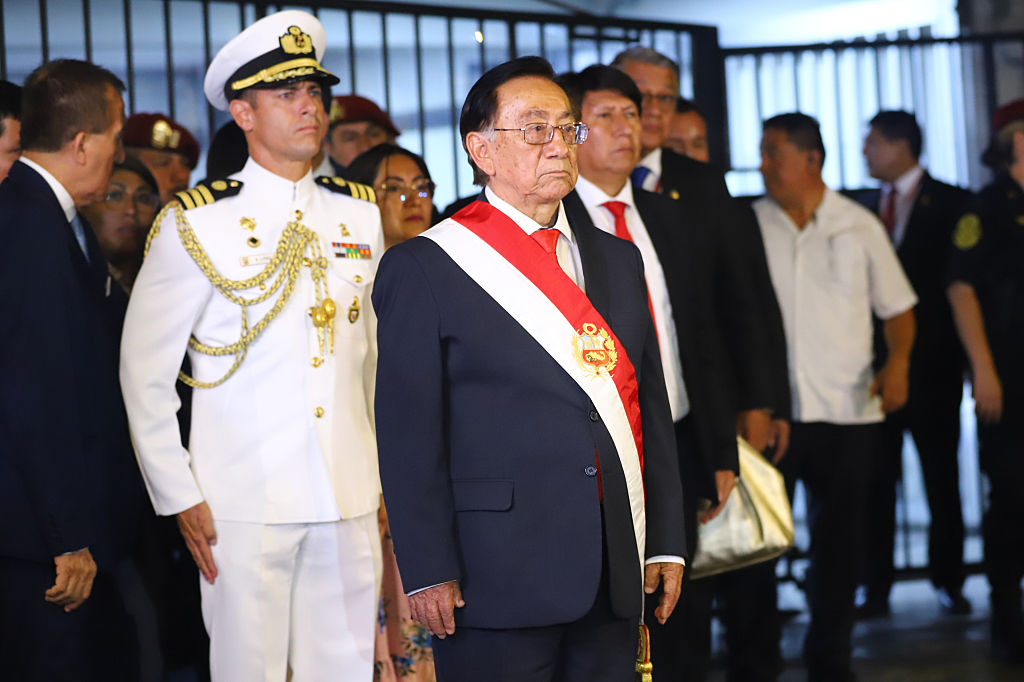Dueling Supreme Court Judges Grapple for Power in El Salvador
Dueling Supreme Court Judges Grapple for Power in El Salvador
A constitutional crisis imperiling the balance of power in El Salvador has resulted in two opposing groups of Supreme Court justices.
A constitutional crisis dividing the legislative and judicial branches of El Salvador’s government deepened in recent days as two different groups of Supreme Court judges assumed power. With the balance of power at stake and political party rivalries at the fore, the country’s Supreme Court is facing off against the National Assembly over judicial appointments. Protests roiled the capital as two groups of justices took office—one court backed by the National Assembly with 10 judges and another backed by the Constitutional Court with five judges. When the new president of the Assembly-backed court appeared for his first day on the job, he and his colleagues found their offices locked and required a locksmith to let them in.
The current crisis began on June 5, when the Supreme Court’s Constitutional Chamber ruled that the National Assembly can only hold a single election for Supreme Court judges for each three-year term of the legislative body. El Salvador’s Supreme Court consists of 15 judges, each elected for a nine-year term. With last month’s decision, the Court ruled the judicial elections of 2006 and 2012 unconstitutional, claiming there were duplicate elections. Five magistrates elected in 2006 and five magistrates elected in 2012 are now considered illegitimate by the Court’s constitutional body.
The crisis has implications for both the balance of power and political rivalries. Writes Latin America analyst James Bosworth: “It's a power grab by the legislative branch in the sense that they are trying to ignore a judicial branch decision. It's a power grab by the judicial branch in the sense that they are trying to influence the selection of their own membership.” There’s also evidence of sparring between the left-leaning Faribundo Marti National Liberation Front (FMLN), which controls the presidency, and the right-leaning Nationalist Republican Alliance (ARENA), which won a narrow majority of the National Assembly in March. The 2012 judicial election took place on April 24, just days before the newly elected Assembly with an ARENA majority took office. In addition, the Court’s new president is backed by the FMLN and opposed by ARENA. "We’re facing the deepening of the most serious institutional crisis since the end of the civil war. In the end it’s a legal battle for the share of power,” said Salvadoran political analyst Roberto Cañas.
The Court proposed a solution: to hold a new vote to replace the “unconstitutional” elections held in 2006 and this year. But the National Assembly refused, and challenged the ruling by bringing the case before the Central American Court of Justice (CCJ). This court ruled on June 21 in favor of the National Assembly, temporarily blocking the Chamber’s decision. President Mauricio Funes asked the Supreme Court to abide by the CCJ ruling. On July 14, Funes went further, expressing disagreement about the Supreme Court’s ruling and calling the crisis “political,” stemming from conflict between the governing FMLN and ARENA, which lost power in 2009.
The crisis continued as two sets of judges took office on July 2—one group elected in the contested 2006 and 2012 votes, and another group elected in 2009. After the parallel courts took office, dual protests shook San Salvador, as one side supported the National Assembly and the other the Constitutional Court. José Belarmino Jaime, president of the Supreme Court and the Constitutional Chamber, led the 2009 group of judges. But his term ended on July 16, when he was replaced by Ovidio Bonilla—one of the judges elected in 2012 and whose appointment is considered invalid by the Constitutional Court.
The change in the Court’s presidency marked a decisive moment on Monday, when the 10 judges elected in 2006 and 2012 went to work to find their offices locked. Amid protests outside the courthouse, these judges hired a locksmith and met with Bonilla, who called for an end to the judicial crisis. The fate of the dueling courts could depend on a final decision from the CCJ, though no date’s been set for the ruling.
Learn More:
- See the Constitutional Chamber’s original decision about the judicial elections.
- Read an overview of the crisis from Tim’s El Salvador blog.
- See live coverage of the crisis from La Prensa Gráfica’s Twitter feed.







